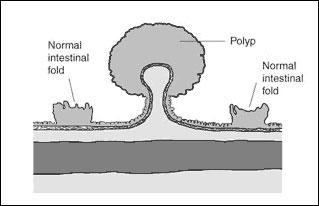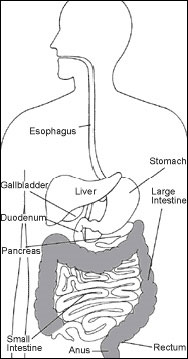What are colon polyps?
According to WebMD.com, colon polyps are growths on the lining of your colon or large intestine, part of your digestive tract.
According to WebMD.com, colon polyps are growths on the lining of your colon or large intestine, part of your digestive tract.
Colon PolypsMost polyps are not dangerous. Most are benign, which means they are not cancerous. But over time, some types of polyps can turn into cancer. Usually, polyps that are smaller than a pea aren’t harmful. But larger polyps could someday become cancerous or may already be cancerous. To be safe, doctors remove all polyps and test them.
Celiac disease is a genetic disease, meaning it runs in families. Sometimes the disease is triggered or becomes active for the first time after surgery, pregnancy, childbirth, viral infection or severe emotional stress.

Anyone can get polyps, but some individuals have increased risks more than others. You may have a greater chance of getting polyps if:
You may also be more likely to get polyps if you:

Most small polyps don’t cause symptoms. Often, people don’t know they have one until the doctor finds it during a regular checkup or while testing them for something else.
However, some individuals experience the symptoms below:
The doctor can use four tests to check for polyps: Digital rectal exam. The doctor wears gloves and checks your rectum, the last part of the large intestine, to see if it feels normal. This test would find polyps only in the rectum, so the doctor may need to do one of the other tests listed below to find polyps higher up in the intestine. For barium enema, the doctor puts a liquid called barium into your rectum before taking x rays of your large intestine. Barium makes your intestine look white in the pictures. Polyps are dark, so they’re easy to see.
Sigmoidoscopy. With this test, the doctor can see inside your large intestine. The doctor puts a thin flexible tube into your rectum. The device is called a sigmoidoscope and it has a light and a tiny video camera in it. The doctor uses the sigmoidoscope to look at the last third of your large intestine.
Colonoscopy. This test is like sigmoidoscopy but the doctor looks at all of the large intestine and it usually requires sedation.
Talk to your doctor about getting tested for polyps if:
The doctor will remove the polyp. Sometimes, the doctor takes it out during sigmoidoscopy or colonoscopy. The polyp is then tested for cancer.
If you’ve had polyps, the doctor may want you to get tested regularly in the future.
Doctors don’t know of any one sure way to prevent polyps. But you might be able to lower your risk of getting them if you:

Today, gastroenterology conditions can be treated effectively. We provide everyone a personalized gastroenterology treatment plan to meet your unique needs and improve your quality of life. Contact our gastroenterology and hepatology center to schedule a consolation with Los Angeles’ preferred Gastroenterologist– Dr. Tabib.
Dr. Tabib’s completed his postgraduate fellowship, residency, and internships at the UCLA/Cedar-Sinai Medical Center.
Get your
Consultation
Today!
Siamak Tabib, M.D., Inc.
8631 W 3rd St Suite 1015E,
Los Angeles, CA 90048
(310) 683-4911
Voted Best Gastroenterologist in Los Angeles
2010-2025
